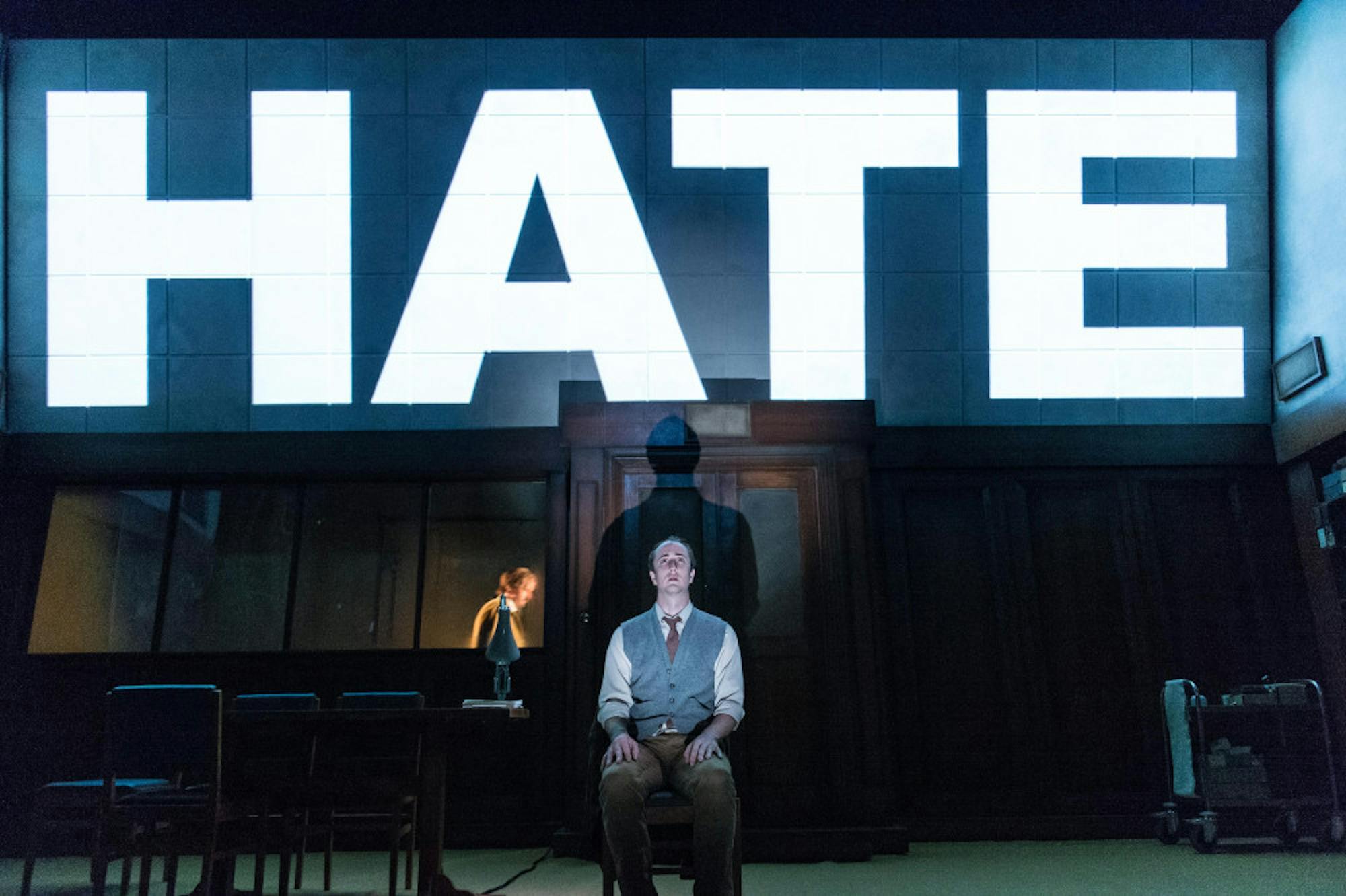The tragedy in San Bernardino has reignited the debate over the extent of privacy Americans are entitled to in their digital lives. While Apple refuses to assist in cracking open the gunman’s iPhone, the company’s transition on this matter from the paragon of information gathering to the defender of privacy shows how times have changed. What has not changed, even since 1949 when George Orwell’s “1984” first hit shelves, is that Big Brother is watching you.
The American Repertory Theater is now showing a production based on the classic novel that draws parallels between the well-founded paranoia of government surveillance today and Orwell’s dystopian future of yesteryear. In fact, this is the first theatrical production of the book, according to Orwell's estate. Loosely framed by scenes derived from the book’s appendix in which Orwell suggests that Big Brother has fallen and the world has moved on, the production brings to life the oppressive monotony of a world communicated through Newspeak.
As one character puts it, with the excitement that only a linguistics geek-in-denial could muster, Newspeak is the only language that gets smaller over time. Its vocabulary is handed down from the party itself, which seeks to eliminate all words that enable even the thought of dissent. All crimes are “thoughtcrimes,” since they begin as a mere thought. A poignant linguistic quirk comes up when the linguistics enthusiast gushes over the brilliance of the words good and “ungood” and proclaims the latter superior to the word “bad,” since bad is not always the exact opposite of good. “1984” is full of moral paradoxes like this one. In one scene, Winston (Matthew Spencer) and Julia (Hara Yannas), the story’s protagonists, are shown video evidence of the ungood they were willing to commit for what they thought was the greater good.
There are also some continuity paradoxes to explore, the most profound being the existence of Winston’s story in the first place. For his thoughtcrimes against Big Brother, Winston is erased from history (“unpersoned” in Newspeak) -- yet there he is on stage. The rabbit hole runs very, very deep.
The production itself is a wonder, but, at 101 minutes without intermission, audiences should prepare for a long haul. Every second and every movement are choreographed precisely so as to create just the image the creators (Robert Icke and Duncan Macmillan) and the actors desire. Their retro-futuristic set seamlessly integrates cameras and live projections with amazing dexterity, simultaneously augmenting the experience by highlighting small moments and adding to the uneasy feeling of Big Brother being just over your shoulder; the private room where Winston and Julia abscond is almost only ever shown through cameras, betraying their privacy and demonstrating the futility of their situation from the outset.
Light and sound design are breathtaking in this production of “1984.” Transitions between scenes are often so quick that they seem impossible -- the actors must have appeared out of thin air. This production borrows many of its effects from science fiction and horror films; the arrival of a character might cause lights to act up or the audience may see one character walking down the hallway before seeing another character open the door. Or, the set may just fall away completely.
It is after everything literally falls apart that the production becomes harder to watch. Winston is tortured for his thoughtcrimes until he finally rats on Julia. While the show spares audiences some of the more brutal parts of the torture,it is not an easy experience -- there were a few audible reactions around the audience.
Winston begs the audience to intervene on his behalf. Who knows if the actors have a contingency plan for what if anyone actually feels moved to help the beaten hero of the play? It would definitely be interesting to see. When no one does anything, however, the silence harkens back to one of the main tenets of the performance: the definition of truth. Is truth the sum of our own individual experiences, or is it what we are told, but cannot verify, is true? Are people content just to be told that things are changing for the better -- do people accept reality as it is or as they are told it is or as they want it to be? How much is security worth? Our privacy? The A.R.T. production of “1984” is one of those shows that pulls the conversation out of viewers – it gets them talking. Yet, even though the show inspires conversation, it also challenges the notion that the conversation will lead somewhere. That, after all, is in the audience’s hands.
'1984' comes to life at American Repertory Theater

"1984" is full of moral and existential paradoxes.
Summary
Subtle doesn't describe any aspect of this show, but it will wow audiences with its production quality and profundity.
4.5 Stars





